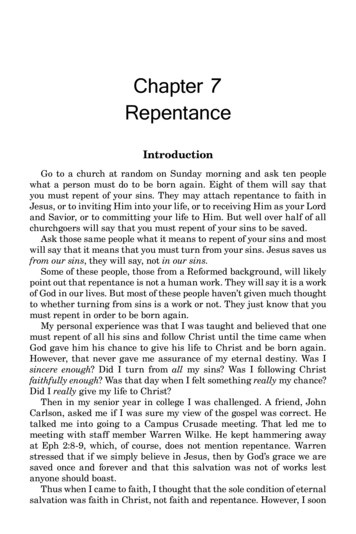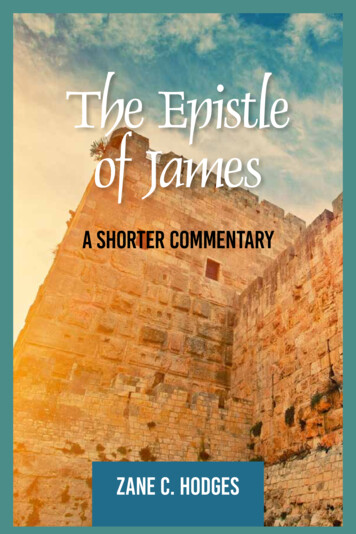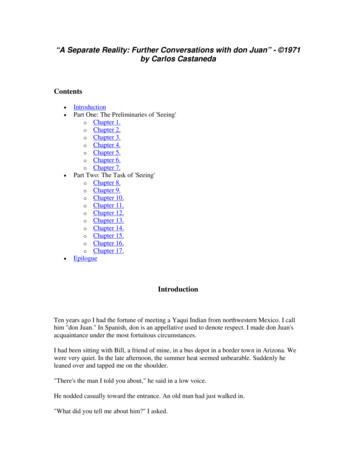
Transcription
Chapter 7RepentanceIntroductionGo to a church at random on Sunday morning and ask ten peoplewhat a person must do to be born again. Eight of them will say thatyou must repent of your sins. They may attach repentance to faith inJesus, or to inviting Him into your life, or to receiving Him as your Lordand Savior, or to committing your life to Him. But well over half of allchurchgoers will say that you must repent of your sins to be saved.Ask those same people what it means to repent of your sins and mostwill say that it means that you must turn from your sins. Jesus saves usfrom our sins, they will say, not in our sins.Some of these people, those from a Reformed background, will likelypoint out that repentance is not a human work. They will say it is a workof God in our lives. But most of these people haven’t given much thoughtto whether turning from sins is a work or not. They just know that youmust repent in order to be born again.My personal experience was that I was taught and believed that onemust repent of all his sins and follow Christ until the time came whenGod gave him his chance to give his life to Christ and be born again.However, that never gave me assurance of my eternal destiny. Was Isincere enough? Did I turn from all my sins? Was I following Christfaithfully enough? Was that day when I felt something really my chance?Did I really give my life to Christ?Then in my senior year in college I was challenged. A friend, JohnCarlson, asked me if I was sure my view of the gospel was correct. Hetalked me into going to a Campus Crusade meeting. That led me tomeeting with staff member Warren Wilke. He kept hammering awayat Eph 2:8-9, which, of course, does not mention repentance. Warrenstressed that if we simply believe in Jesus, then by God’s grace we aresaved once and forever and that this salvation was not of works lestanyone should boast.Thus when I came to faith, I thought that the sole condition of eternalsalvation was faith in Christ, not faith and repentance. However, I soon
108The Ten Most Misunderstood Words in the Biblefound that was not the normal position in Campus Crusade (or later atDallas Theological Seminary, either).What Is Repentance?For the person who believes in justification by faith alone, this question is, in a sense, the question. If repentance in the New Testament, forexample, is turning from sins, then it cannot be a condition for justification before God, since the sole condition of that justification is faith inChrist and turning from sins is not the same as believing in Jesus. (Anatheist can turn from his sins. So can a person from any religion orphilosophy.)When I wrote my doctoral dissertation on the subject of repentance, Ihad to deal with this question. I came at it backwards, however. Insteadof looking to see what the words metanoeo„ and metanoia mean in the NewTestament, I assumed that they meant a change of mind and then I setabout to prove it.I held to what is called the change-of-mind view because it was theonly view that I was aware of, or that I could conceive of, that would bothaffirm justification by faith alone and also handle texts that seemed toclearly show that repentance is a condition of eternal life. That I didnot think carefully enough about other options led me to miss the clearteaching of Scripture.Both in the Old Testament and in the New Testament repentance isturning from sins. It is never a change of mind about oneself (recognizing one is a sinner) or a change of mind about Christ (recognizing Healone is the Savior).I cannot in a short book go through every passage proving my point.However, below I cover the eleven passages which are most often citedas teaching that repentance is a condition of everlasting life. None ofthem actually do teach that repentance is a condition of spending eternity with the Lord.However, in this portion of this chapter my goal is simply to showwhat Biblical repentance is. For that let’s turn to Jesus’ teaching aboutthe repentance of the Ninevites under the preaching of Jonah. Jesusused Old Testament repentance to teach what New Testament repentance is.Jesus said, “‘The men of Nineveh will rise up in the judgment withthis generation and condemn it, because they repented at the preachingof Jonah; and indeed a greater than Jonah is here’” (Matt 12:41, emphasis added). The Lord is referring to Jonah 3:5. There we read, “So thepeople of Nineveh believed God, proclaimed a fast, and put on sackcloth,
Repentance109from the greatest to the least of them.” Verse 10 concludes the chaptersaying, “Then God saw their works, that they turned from their evil way;and God relented from the disaster that He had said He would bringupon them, and He did not do it.”Clearly the Ninevites repented when they turned from their evil way.Their repentance was not a change of mind about themselves and God.They believed God when through Jonah He said, “Yet forty days, andNineveh shall be overthrown!” (Jonah 3:4).What then was the repentance that Jesus was rebuking that generation of Jews for not doing? They, too, were not turning from their sins.That same understanding fits every single New Testament use.During the Tribulation the unbelieving world “[will] not repent of theworks of their hands, that they should not worship demons, and idols And they did not repent of their murders or their sorceries or theirsexual immorality or their thefts” (Rev 9:20-21; see also Rev 16:9, 11).Repentance is turning from one’s sins in order to escape temporaljudgment. The issue in repentance is not who is born again and who isnot. The issue is who is walking in open rebellion against God and whois not. The consequence of turning from one’s sins is not the gaining ofeternal life, but the improvement of and extension of one’s life here onearth, whether for the believer or unbeliever.Repentance and Regenerationin the Old TestamentThe Old Testament never links repentance and salvation frometernal condemnation. Of course, the Old Testament rarely if ever evenuses the term salvation to refer to the new birth, so the fact that the OldTestament doesn’t link repentance and regeneration is no surprise.Ezekiel 18 is a key chapter devoted to the Old Testament concept ofrepentance. There the prophet, speaking for God, says that “if a wickedman turns from all his sins which he has committed, keeps all My statutes, and does what is lawful and right, he shall surely live; he shallnot die” (Ezek 18:21). However, if the wicked man does not turn fromhis wicked ways, then he will die. Physical life and physical death arein view. Ezekiel 18 ends with these powerful words that could be saidat any twelve-step meeting: “‘For I have no pleasure in the death of onewho dies,’ says the Lord God. ‘Therefore turn and live!’” (Ezek 18:32).In the Old Testament repentance is the medicine the nation ofIsrael needed in order to escape ongoing pain and suffering due to her
110The Ten Most Misunderstood Words in the Biblesins. The Pentateuch, as well as Judges, 1-2 Samuel, 1-2 Kings, and1-2 Chronicles, teaches this over and over again.Since I’ve written in more detail elsewhere on repentance in the OldTestament, I urge the interested reader to check out my online journalarticles on the subject.1 We now turn to see what the New Testamentsays about the linkage between repentance and regeneration.Repentance and Regenerationin the New TestamentThe New Testament never conditions regeneration upon repentance.I realize that statement is in direct opposition to what most churchpeople believe. However, we should not base our view of what God sayson what the majority says. We should base it on our own personal studyof the Word of God. We are each accountable to God for our own understanding of His Word. We are not allowed to pass that responsibility onto some church or denomination or pastor or priest. God holds each of usaccountable for our own study of the Bible.How do I know that the New Testament never indicates that repentance is a condition of regeneration? There are two ways I know thiswith certainty.First, there are many crystal clear passages in the Gospel of Johnin which the Lord Jesus Christ, the authority on regeneration, saysthat the sole condition of the new birth/everlasting life is believing inHim (e.g., John 3:14-18; 4:1-14; 5:24; 6:35-40, 47; 11:25-27; 20:30-31). Forexample, Jesus said, “He who believes in Me has everlasting life” (John6:47).You may think, yes, but doesn’t the Lord somewhere in John say thatunless you repent you will perish? Actually, no. Those are words of Jesusfound in Luke 13:3, 5. That is explained below (and in Chapter 4). But inJohn’s Gospel, the words repent (metanoeo„) and repentance (metanoia) donot occur even once. That is quite telling.Here is a syllogism that makes the point that repentance is not acondition of regeneration:Major premise: The Gospel of John tells us what we must doto be born again (John 20:30-31).1 Go to www.faithalone.org and click on Journals & Newsletters. Then go downand select Our Semi-annual Journal. Now go down to the search box and type inrepentance. You will find one article by me from 1998 and six articles from 1988through 1991. The one on repentance in the Old Testament is from Spring 1989 andwas part two in a six-part series.
Repentance111Minor premise: The Gospel of John never once mentionsrepentance.Conclusion: The Gospel of John teaches that repentance is nota condition of the new birth.Some might say that is an argument from silence. I agree with ZaneHodges who famously said that this is an argument about silence.2Imagine a book about the leading generals of the Allied forces inWWII. Let’s say it never mentioned General George Patton. If so, itwould be clear that the author did not consider Patton to have been oneof the leading generals in the Second World War. No other conclusionwould be possible. That would be a legitimate argument about silence.Similarly, the fact that John knew about repentance (witness histwelve uses of the term in the Book of Revelation) and likely was a disciple of John the Baptist—who preached repentance—before he becamea disciple of Jesus (cf. John 1:35-42), yet didn’t even mention repentancein his evangelistic book, is proof he did not consider it to be a conditionof everlasting life.Second, there is not a single verse anywhere in the New Testamentthat says that one who repents has everlasting life or even that onemust repent in order to have life everlasting. Not one.From 1983 to 1985 I wrote my doctoral dissertation on this verysubject. The title of my dissertation is “Repentance as a Condition forSalvation in the New Testament.” In my dissertation I argued—wrongly,I now realize—that there are eleven passages that indicate that repentance is a condition of eternal life. I later came to see that none of thoseactually say that repentance is a condition of the new birth.Let’s examine those eleven passages now.Eleven New Testament Passages ThatOnly Seem to Teach That RepentanceIs a Condition for the New BirthMatthew 3:2. John the Baptist was famous for proclaiming, “Repent,for the kingdom of heaven is at hand!” I once read that as though hewere saying, repent so that you can be born again.That is obviously not what he said or meant. The fact that the Kingof the coming kingdom was on the scene meant that the nation shouldrepent in order for Him to establish His earthly reign. The issue hereSee Zane C. Hodges, “Arguments from Silence, And All of That: RepentanceReconsidered,” Grace in Focus (May-June 1998): 1, 4.2
112The Ten Most Misunderstood Words in the Bibleis not individual regeneration. The issue is national deliverance fromGentile bondage. In order for the kingdom to come to that generation ofJews, the nation had to repent at the preaching of John and the Messiah,the Lord Jesus Christ.John the Baptist did not say that the kingdom would have come if thenation had merely repented. He said that the nation should repent sincethe kingdom of God was at hand. In reality John also called for faithin the Messiah as a second condition for the kingdom to come for thatgeneration (cf. John 1:7; Acts 19:4). In order for the Lord Jesus to givethe kingdom to that first century generation of Jews, the nation had toboth repent of her sins and believe in Him. In fact, those two conditionsmust still be met. During the Tribulation, they will be. At the end ofthe Tribulation every surviving Jew on earth will have repented andbelieved in the Lord Jesus (cf. Rom 11:26).Matthew 4:17. Jesus began His ministry with exactly the samemessage, “Repent, for the kingdom of heaven is at hand.” He too calledfor national repentance, and, of course, faith, in order for the kingdomto come (e.g., Matt 23:37).Mark 1:14-15. Mark says that “Jesus came to Galilee, preaching thegospel of the kingdom of God, and saying, ‘The time is fulfilled, and thekingdom of God is at hand. Repent, and believe in the gospel.’”At first blush it might appear that the Lord is saying that to be bornagain one must both repent and believe in Him. However, a carefulexamination shows that is not at all what He means.First, notice that He was preaching “the gospel of the kingdom ofGod.” The gospel of the kingdom occurs only in the Synoptic Gospels andalways refers to the good news that the kingdom has drawn near. Thatis why it is called “the gospel [or good news] of the kingdom of God.”Second, the Lord was not speaking about the new birth here. Thistext is nothing like John 3:16, for example. In light of the good news ofthe kingdom being offered to that generation, they were being calledto repentance and faith so that the kingdom might come, not so thatindividual Jews might be born again. Jesus was offering that generation the kingdom.Third, Jesus does not say, “repent, and believe in Me.” Instead, Hesays, “repent, and believe in the gospel.” While many automaticallyassume that gospel means the saving message, that is not the casehere or in any New Testament uses of the expression the gospel of thekingdom. Here the words the gospel in verse 15 refer to “the gospel ofthe kingdom” in verse 14. (See Chapter 9 for more details about theexpression the gospel.)
Repentance113Thus Jesus is calling for national repentance and national faith thatthe kingdom is at hand (which would, of course, include the fact thatJesus is the King/Messiah).Of course, if an individual Jew did believe “the gospel of the kingdom,”then he should believe as well that Jesus is the Messiah who guaranteeseternal life to all who simply believe in Him (e.g., John 11:25-27). Ofcourse a person might believe the gospel of the kingdom and not yet haveunderstood the Old Testament teaching on justification by faith alone(e.g., Gen 15:6) or have heard the Lord Jesus say that all who believein Him have everlasting life. However, once a person who believed thatJesus was the King of Israel, the Messiah, heard Him say that all whobelieve in Him have everlasting life (e.g., John 5:24), he certainly shouldbelieve Him, even if he had up to that point believed in the works salvation taught by the rabbis of the day.It should have been obvious to me when I was working on my dissertation that the message, “Repent, and believe in the gospel,” is notthe message of life. That I tried to make it into that (I argued Jesusmeant, “Change your mind; that is, believe the gospel”) shows that Iwas not allowing the Scriptures to speak, but was instead imposing myFree Grace theology on the text. While Free Grace theology is true, notevery text is evangelistic. Not every text explains what one must do tobe born again.Luke 13:3-5. What did Jesus mean when He said, “Unless you repentyou will all likewise perish”? This text is discussed in greater detail inChapter 4. As a recap, the context is clear that physical death is in view,both with the people “whose blood Pilate had mingled with their sacrifices” (Luke 13:1) and with the eighteen people “on whom the tower inSiloam fell” (Luke 13:4). They died physically. Whether they were bornagain is not discussed. Some might have been. All might have been.None might have been. That isn’t the point. The point is that they alldied physically.Jesus was saying that unless that generation of Jews repented,they would all likewise perish, that is, die, at the hands of Rome. Ofcourse, that is what happened in the Jewish War of AD 66-70 in whichJerusalem was destroyed and over a million Jews were killed.Remember Nineveh? Though God didn’t tell Jonah to preach repentance, the people did repent and were spared. God could have said,“Repent or you will all perish.” They did repent, so they did not perish.The Jews of the first century did not repent; hence, they perished inthe Jewish War.
114The Ten Most Misunderstood Words in the BibleLuke 16:19-31. The Lord told a story about a rich man and a poor manwho died. The rich man went to torment in Hades, whereas the poorman went to the good part of Hades where Abraham was.The Lord reports a dialogue between the rich man and Abraham.In the course of the discussion the rich man asks Abraham to sendLazarus back from the dead to visit his brothers. Abraham says, “Theyhave Moses and the prophets; let them hear them.” Then the rich manresponds, “No, father Abraham; but if one goes to them from the dead,they will repent.”The rich man did not say, “If one goes to them from the dead, they willbelieve.” He spoke of repentance. So what does that tell us?Here I was led astray by the comments of an unregenerate man who isin Hades. That the man was an unbeliever should have given me pausebefore I interpreted him to be proclaiming the Free Grace message.The story of the rich man and Lazarus is probably not a parable.There is not a single parable in which the Lord gives an actual nameof a person. Here we have the actual name of one of the characters,Lazarus.The rich man looks across a great gulf and sees Lazarus right next toAbraham. What ensues is a fascinating conversation between the richman and Abraham.What is clear is that Abraham grasps the Free Grace message. It isnot clear that the rich man does.The rich man wants Abraham to send someone back from the deadso that his brothers might repent. The rich man seems to think thatthe way to avoid his tormented fate is to repent. Yet Abraham keepssteering the rich man back to the truth that the issue is belief in Jesus,or persuasion about Him, not repentance: “They have Moses and theprophets; let them hear them If they do not hear Moses and the prophets, neither will they be persuaded though one rise from the dead” (vv 29,31, emphasis added). While Abraham does not explicitly say the name ofJesus, it is clear that Abraham means that the issue is what Moses andthe prophets wrote about the Messiah, the Lord Jesus (cf. John 1:45).The rich man says, “No, father Abraham; but if one goes to them fromthe dead, they will repent” (v 30). His statement does not follow fromwhat Abraham had said.It is possible that the rich man believes that if his brothers repented,then they would also come to faith in Jesus. But if so, why didn’t he saythat? It is more likely that the rich man still doesn’t understand thesaving message. Abraham is moving him to grasp the real reason whyhe is in torment.
Repentance115Of course, even if the rich man got it, he would remain in torment.As the Lord Jesus taught, “whoever lives and believes in Me shall neverdie” (John 11:26, emphasis added). Once a person dies, he is unable toescape his fate even if he eventually comes to believe the message of life(cf. Heb 9:27).The Lord Jesus was not teaching in Luke 16:30 that repentance is acondition of eternal life.Luke 24:47. This is Luke’s version of the Great Commission. The Lordsays, “Thus it is written, and thus it was necessary for the Christ tosuffer and to rise from the dead the third day, and that repentance andremission of sins should be preached in His name to all nations, beginning at Jerusalem” (Luke 24:47, emphasis added). As should be obviousto anyone reading the Great Commission in Matthew (Matt 28:18-20),the Great Commission was primarily a charge to make disciples, not toevangelize.If the Lucan account of the Great Commission is viewed narrowly asevangelistic, then one will likely conclude that repentance is a conditionfor everlasting life. However, that is not what the Lord says, nor is itwhat He means.What the repentant person gets, according to the Lord in Luke 24:47,is not everlasting life, but “remission of sins.” While many people equatethese two, they are not at all the same. For example, as 1 John 1:9shows, regenerate people need ongoing forgiveness.If we compare this passage with Acts 2:38, discussed next, then thereis reason to believe that the Lord wanted the disciples, “beginning atJerusalem” (Luke 24:47), to call Jews and Gentiles to repent that theymight have fellowship forgiveness.This is part of a discipleship message, not an evangelistic one. Thisverse in no way contradicts John 3:16. They are not talking about thesame subjects.Acts 2:38. “Then Peter said to them, ‘Repent, and let every one of yoube baptized in the name of Jesus Christ for the remission of sins; and youshall receive the gift of the Holy Spirit.’” In Peter’s great sermon on theDay of Pentecost, he preached Jesus. He preached that the Lord Jesus isIsrael’s long-awaited Messiah. But he responded to the question, “Whatshall we do?” (Acts 2:37) with a call to repent and be baptized. Why didPeter say that? Why didn’t he call his audience to believe in the LordJesus Christ (cf. Acts 16:31)?After giving the compelling evidence of Jesus’ bodily resurrection, ofwhich Peter and his brethren were eyewitnesses (Acts 2:32), Peter then
116The Ten Most Misunderstood Words in the Biblesaid, “Let all the house of Israel know assuredly that God has made thisJesus, whom you crucified, both Lord and Christ” (Acts 2:36).At this point Luke says, “Now when they heard this, they were cut tothe heart, and said to Peter and the rest of the apostles, ‘Men and brethren, what shall we do?’” That is far from a hostile response. That is notan unbelieving response. They were grieved at what they had done. Thereason for their grief is obvious: they realized they indeed had a part inkilling the Messiah. They had believed what Peter said. That is clear.While Luke’s report of Peter’s sermon does not mention everlastinglife, it is certainly possible that in what surely was a lengthy sermonPeter mentioned the promise of life. In any case, Peter’s audience wouldhave been very familiar with Jesus’ claim not only to be the Messiah,but also to give eternal life to all who believe in Him (cf. John 20:31).Thus once they believed what Peter said, they also believed the promiseof life and they knew they had eternal life. What they did not know washow they could escape the guilt of having killed the Messiah.Note they do not ask what the Philippian jailer asked, “What must Ido to be saved?” (emphasis added). Their concern is a fellowship concern,not an eternal life concern. They ask, “What shall we do?” (v 27). Theimplied conclusion to their question is, “What shall we do to escape theguilt of having killed the Messiah?”The answer is that they should do two things, repent and be baptized. As in Luke 24:47, repentance is linked with the forgiveness ofsins. Baptism is linked with the reception of the Holy Spirit.Wait a minute, some will say. If they had not yet received the Spirit,then they were not yet regenerate.A person might think that, but he would be wrong as the Book of Actsmakes clear. In Acts 8, for example, Philip leads a group of Samaritansto faith in Christ. They are born again and baptized. Only later didPeter and John come and lay hands on them and they at that pointreceived the Holy Spirit. In the early Church the reception of the Spiritoften followed the new birth.The Apostle Paul himself is another example in the Book of Acts. Hewas born again on the road to Damascus (Acts 9:4-9; Gal 1:11-12). Threedays after his new birth he received the Spirit when Ananias laid handson him (Acts 9:17). (He also was required to submit to baptism before hewas forgiven, as Acts 22:16 shows.)Even Jesus’ own disciples did not receive the Spirit until nearly fouryears after they were born again. They came to faith at the start ofJesus’ three and a half year ministry (cf. John 2:11). Yet they did not
Repentance117receive the Spirit until Pentecost after Jesus rose from the dead (Acts1:8; 2:1-21).Acts 2:38 is not teaching that repentance and baptism are conditionsof everlasting life. It is teaching that for the new Jewish believers whohad personally participated in the death of Jesus, they must repent andbe baptized to have fellowship forgiveness and to receive the indwellingHoly Spirit.3Acts 11:18. After hearing Peter’s report about Cornelius and hishousehold coming to faith, Jewish believers with him said, “Then Godhas also granted to the Gentiles repentance to life.” What is repentanceto life?In my dissertation I assumed the expression referred to repentanceto everlasting life because Peter was clearly saying that these Gentileswere born again and had received the Spirit and hence he was in noposition to refuse to baptize them. However, while that is what Peterwas saying, that doesn’t mean that that is what his Jewish companionswere saying. These Jewish believers might have been saying that Godhas granted to Gentiles that they might turn from their sins and havefullness of life, including equal footing in the church, that is, life everybit as full as Jewish believers.Zane Hodges argues for that second possibility:It was thus evident that the Gentiles had entered into thesame “life experience” that believing Jews enjoyed, that is,they were fully blessed by the God with whom they were nowobviously in harmony. We might say, “They entered into theChristian life.”4Hodges viewed the statement of Peter’s friends as meaning that Godhad granted Gentile believers every bit the same life as Jewish believers. They would not be second-class members of the Church. They toowould have the Spirit and the forgiveness of sins.A third possibility is that these men were saying that turning fromsins leads to everlasting life. If they meant this they would not be3 For more detailed explanation of this passage, see Lanny Thomas Tanton,“The Gospel and Water Baptism: A Study of Acts 2:38,” and “The Gospel and WaterBaptism: A Study of Acts 22:16” in Journal of the Grace Evangelical Society (Spring1990 and Spring 1991): 27-52 and 23-40, respectively. These articles are availableonline at http://www.faithalone.org/journal/index.html.4 Zane C. Hodges, Harmony with God: A Fresh Look at Repentance (RedencionViva: Dallas, TX, 2001), 118. In an earlier 1998 newsletter article, cited above (fn 2),Hodges said, “No text in the NT (not even Acts 11:18) makes any direct connectionbetween repentance and eternal life. No text does that. Not one” (emphasis his).
118The Ten Most Misunderstood Words in the Biblesaying that it is a condition of eternal life. They would simply mean thatrepentant Gentiles are people to whom God would bring the messageof eternal life so that they could simply believe in Jesus and be bornagain. In favor of this view is that Cornelius is evidently a man who hasrepented at some point in the past. His alms and prayers ascended toGod (Acts 10:4, 31). Acts 10:35 may support this interpretation as well.Against this view, however, is the fact that repentance is not mentionedat all in Acts 10:1–11:17. While it is apparent that repentance occurredat some point in the past, it is not mentioned even once.If this third view is correct, it would mean that repentance makesfaith more likely, not that repentance is a condition of everlasting life orthat all who repent come to faith.Of course, as Hodges points out, if the first view accurately reflectswhat these men meant, then these Jewish believers were in major error.5Even the Old Testament is clear that Gentiles could know God and beguaranteed a place in the coming kingdom, as Paul shows by means ofOld Testament quotations in Rom 15:8-13. And the Lord was clear thatthis message is for all, even to the ends of the earth (Matt 28:18-20). Thisinterpretation is highly unlikely since 1) Peter does not correct them, 2)Luke does not correct them with some sort of editorial comment, and 3)there is no indication in the text that these Jewish brethren are in someway defective in their understanding of the saving message.Zane Hodges argued for the second option, the equal life view. Ibelieve he is correct, though the third view is possible as well. In anycase, there is no reason here to see these Jewish brethren as contradicting the message of John 3:16 (or the later findings of the JerusalemCouncil [Acts 15:1-29]). Surely if they had done so, Peter would havesoundly corrected them (cf. Acts 15:7-11).Acts 19:4. “Then Paul said, ‘John indeed baptized with a baptism ofrepentance, saying to the people that they should believe on Him whowould come after him, that is, on Christ Jesus.’” In my dissertation Iargued that Paul was saying that the “baptism of repentance” of Johnthe Baptist was designed to call an individual “to first give up self-righteous attitudes and recognize his sinfulness and need of forgiveness.”6I argued that Paul saw this as a prerequisite to believing in Jesus foreternal life, which was clearly the ultimate aim of John the Baptist’sministry.Hodges, Harmony with God, 117-19.5 Robert N. Wilkin, “Repentance As a Condition for Salvation in the NewTestament,” Doctoral Dissertation (Dallas Theological Seminary, 1985), 88.6
Repentance119The problem with this view is that it has no support in the text. Evenin my dissertation I said that in this verse “insufficient information isgiven here to answer this question [i.e., what is the role of repentance inregeneration] fully.” 7Since Paul was the champion of justification by faith alone, my interpretation of
Dallas Theological Seminary, either). What Is Repentance? For the person who believes in justification by faith alone, this ques-tion is, in a sense, the question. If repentance in the New Testament, for . to some church or denomination or pastor or priest. God holds each of us accountable for our own study of the Bible.










